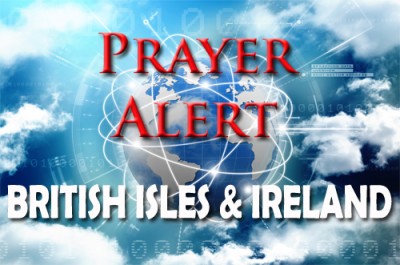Egypt: four bombing suspects arrested
13 Jan 2017Four men have been arrested in connection with the suicide attack at the St Peter and St Paul church in Cairo last month, which killed 28 people and injured over 40. Eleven people are still in the hospital. Egypt's Interior Ministry says one of the four men arrested has links to the Muslim Brotherhood, though the group has denied any involvement. Hours after the attack, the terror group IS said one of its soldiers, named Abu Abdallah-al-Masri, was responsible for carrying out the attack, the worst on Egypt's Coptic Christian community since 2011. Despite this claim by IS, Egypt appears eager to pin the blame on the outlawed Brotherhood. Damage to the church was repaired just before 7 January, the day Coptic Christians celebrate Christmas. The renovations were undertaken by Egypt's army under orders of president Abdel-Fattah El-Sisi, who has promised to rebuild all churches that have been destroyed or damaged since 2013.
Pakistan: Christian food ‘unclean’
13 Jan 2017Many Christian children in Pakistan face discrimination, abuse, hostility and even violence at government schools. A class of schoolgirls in Pakistan were taking an exam in Home Economics. The examiner was tasting the food they had cooked. But when she got to the Christian girls she refused to touch what they had cooked, saying it would make her unclean. She tipped the food in the bin, and the girls failed the exam. Four Christian girls at a Punjabi high school were forced to bring their own drinking glasses and water bottles to school after Muslim students complained they were unclean. There are also many who cannot go to school at all because their parents cannot afford the fees. Instead, children are forced to work as menial labourers, often in high-risk jobs.
The Church in China: persecution and influence
13 Jan 2017The Church is the largest social force in China not controlled by the Communist Party. As a result, there are increasing efforts to restrict the way Christians operate. A considerable number of Christians are still imprisoned. Violence is at a very high level and is increasing: also, churches have been closed, and landlords pressurised to stop renting premises to Christians. The story for Christians in China varies hugely depending on the region. There has been a significant change for the better for Han Chinese, but Christians from minority ethnic groups face a great amount of persecution. ‘There was a woman in my church who was kidnapped by her family when they found out she converted. They took her back to her home village, broke her legs so she could not escape, and then tried to force her to be a Muslim again.’ These are the words of a Christian leader from the Hui people group. Originally from a Muslim family, as most Hui are, she came to Christ 14 years ago. In spite of the enormous risk, many Hui are becoming Christians. ‘It is amazing how the gospel message touches the hearts of the Hui; many are giving up everything to follow Christ.’
Israel: reactions to truck attack
13 Jan 2017A man from the predominantly Bedouin southern city of Rahat has been arrested for posting a video on his Facebook page that called for people to carry out car-ramming attacks, Israeli police said in a statement on Wednesday. The video featured footage from last Sunday’s terror attack, in which an East Jerusalem man drove his truck into a group of Israeli soldiers, then backed up and ran over them again, killing four and injuring dozens. In the background of the video a voice, speaking in Arabic, encouraged people to carry out similar attacks. Police said the suspect, a thirty-year-old Rahat resident, was first detained on Tuesday and would remain in jail at least until Sunday. ‘While protecting free speech, we cannot allow incitement and threats on Facebook’, the statement said. Earlier in the week, police arrested four residents of the Old City in Jerusalem for spray-painting graffiti praising Fadi al-Qunbar, the driver in Sunday’s attack.
Nigeria: army arrests 963 BH suspects
13 Jan 2017On Wednesday the Nigerian army said it had arrested 963 persons suspected to be Boko Haram terrorists during an operation between 4 and 9 January. Commander Lucky Irabor said, ‘On 3 January four women and thirteen children were apprehended by vigilantes and were later handed over to our troops. Preliminary investigation revealed that the women were wives of Boko Haram terrorists who fled from Sambisa forest as a result of our operations. All suspects are now in our custody undergoing investigation. On 5 January, following a tip-off, troops arrested four Boko Haram suspects at Shuwari village. Also on 5 January, 119 Nigerian Internal Displacement Persons (IDPs) were handed over to Nigerian troops at Banki by the Cameroonian forces. On 9 January, a surrendered Boko Haram member was identified as a male sympathiser and spy in Monguno area.’
Spreading the gospel in North Korea
07 Jan 2017Chinese pastors are on their way to North Korea in the New Year to spread Christianity. While remaining anonymous for security reasons, the pastors claim that they have been through the worst of times in life and have only received salvation through God. One pastor was a second-in-command of a mafia gang before coming to Christ. Since then, he has been preaching the gospel to whomever he meets in house churches; some are North Koreans who fled their country to find refuge in China. He and other Chinese pastors are going to preach the gospel in North Korea itself. He said, ‘Before, the North Koreans came to China, but now, we send Chinese people to North Korea through a Christian brother who has a registered travel agency. So, as Christians, we can travel to North Korea.’
Facebook creator no longer an atheist
07 Jan 2017Mark Zuckerberg, who founded Facebook, has announced he is no longer an atheist, but in fact sees religion as ‘very important’. Zuckerberg posted a ‘Merry Christmas and Happy Hanukkah’ message from his family to his followers on Facebook. After he posted the comment, a user asked, ‘But aren't you an atheist?’ In response, the 32-year-old billionaire replied, ‘No. I was raised Jewish and went through a period of questioning things, but now I believe religion is very important.’ When another user asked, ‘But why doesn’t Facebook notify us that it is Jesus’ birthday today?’, Zuckerberg joked, ‘You're not friends with Jesus on Facebook?’ adding a smiling emoji with a halo. Earlier in 2016, he and his wife met Pope Francis to discuss ways in which technology could help the poor.
Epiphany: Jesus for all
07 Jan 2017This is week 1 of the Friday Focus 2017 initiative that provides the opportunity for us to pray where we are, and unite across our nations, supporting all ongoing mission and preparing the way for future mission. HOPE’s aim (along with the World Prayer Centre) is to see the entire church mobilised during 2018 to make Jesus known. John 3:16: 'For God so loved the world that he gave his one and only Son, that whoever believes in him shall not perish but have eternal life.' Because of Jesus we can have the free gift of eternal life with him. Give thanks for Jesus’ death and resurrection. Pray that churches will work together using both words and actions to make Jesus known. Consider how churches in your area can work together to plan a rhythm of mission through 2018, especially at Easter, Harvest and Christmas. (Written by Roy Crowne, HOPE’s Executive Director)







